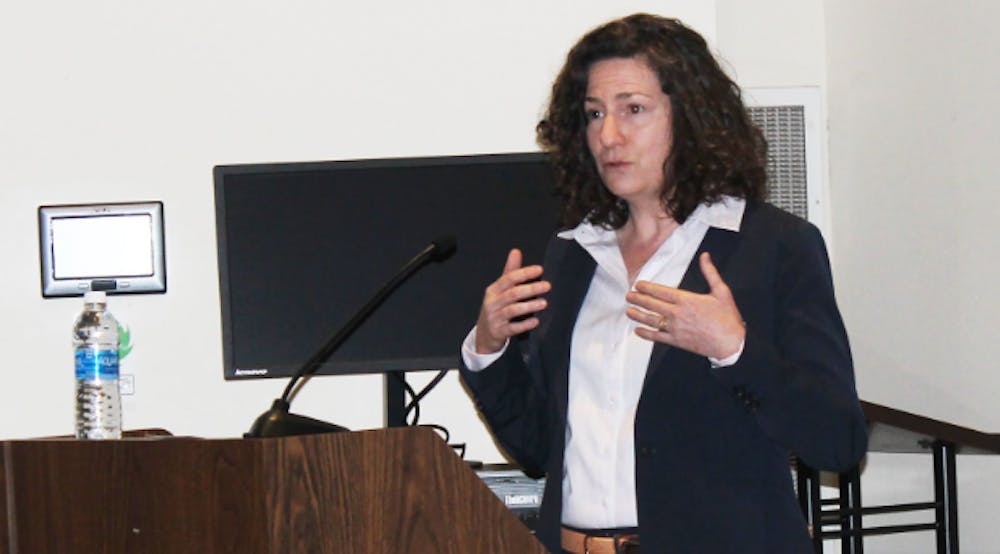Robin Brooks, special advisor to Vice President Kamala Harris, spoke with students at the University of Richmond about democratic backsliding in Eastern Europe on April 17.
Ambassador Anthony Godfrey, a visiting adjunct lecturer for the Jepson School of Leadership Studies and a colleague of Brooks, introduced her at the event. The talk focused on the regime change towards autocracy occurring in Eastern Europe, the topic that Brooks has worked on for the majority of her career, she said.
Brooks began by defining democracy, looking deeper than the obvious answer of the presence of elections, and explaining that true democracy must have rules and that voters must view the outcome as legitimate.
“It's the institutions, the contracts, the transparency, and stakeholder engagement, the feeling of legitimacy that really makes democracy, democracy,” Brooks said.
Brooks went on to describe what these institutions look like in practice; how stakeholders can give feedback to their elected officials and how feedback can create an avenue for change. She emphasized the importance of diversity within democracy, highlighting how the parliamentary systems of many European countries have a structure that allows for a diversity of interests.
Brooks said that the main reason for examining the features of democracy and the democratic values of other countries is to understand how the United States conducts and maintains its foreign relationships through shared democratic values.
Her lecture then shifts to discuss her work in the Biden Administration on National Security strategy. Brooks said that a main priority of the current administration is deepening relationships with other countries on the basis of shared democratic values, beyond treaty allies.
Brooks described how tensions with allies can occur because of democratic backsliding. She used Hungary as an example of a country that has undergone democratic backsliding in the past five or six years, which has increased the risk that tensions within NATO’s alliance could begin to form. She then transitioned to the importance of staying committed to defending democratic governments and institutions through NATO.
“..What we all believe is best for advancing the interests of people, human rights, and the ability to enforce their government,” said Brooks.
She moved quickly from point to point but always returned to her primary focus of democratic values and how the U.S. builds its foreign relationships based on those shared principles.
At one point, Brooks explained how democratic backsliding can start from both the bottom up with populism, and from the top down with despotic leaders. Through methods like disinformation and what she calls “opportunistic authoritarianism”, which is when fairly elected officials begin to use their power for personal gain, democratic backsliding can begin to occur.
Sophomore Braeden Herriott enjoyed learning about democracy in Eastern European countries.
Enjoy what you're reading?
Signup for our newsletter
“It's very interesting how the U.S. is protecting certain countries from any more violent reach from that side of the world,” Herriott said.
Sophomore Kate Chasin appreciated having prominent government representatives speak at UR.
“..especially because global politics are really present around the world and on our campus,” Chasin said.
At the end of the talk, Godfrey conducted the Q&A portion, where he called on professors within the audience of students and faculty with raised hands. Ana Petrova, a visiting assistant professor of political science, asked Brooks about her opinion on how the tactics the U.S. currently uses to handle democratic backsliding might be affected by the U.S.’s own rise in populism over the past seven years.
Because of the nature of the U.S.’s four-year election cycle, Brooks said, there can be discombobulated policies that swing back and forth between parties and presidents.
“..hopefully within the framework of our constitution, and hopefully always towards a more perfect democracy,” Brooks said.
She also theorized that the U.S. has had less influence in the international system than it has in previous years, potentially because other countries are waiting for the upcoming election cycle.
Brooks also emphasized engagement in foreign affairs so that countries would not think the U.S. has disregarded them, and part of the engagement means being open to criticism and making necessary improvements.
Her answer did not address the populism component of the original question.
“While our values are always going to be the basis of our foreign policy, we want to expand on the partnerships on the basis of shared values, with every country in the world, and those interests ultimately come down to those values,” Brooks said.
Contact news writer Sophie Dulog at sophie.dulog@richmond.edu.
Support independent student media
You can make a tax-deductible donation by clicking the button below, which takes you to our secure PayPal account. The page is set up to receive contributions in whatever amount you designate. We look forward to using the money we raise to further our mission of providing honest and accurate information to students, faculty, staff, alumni and others in the general public.
Donate Now



